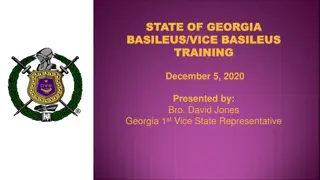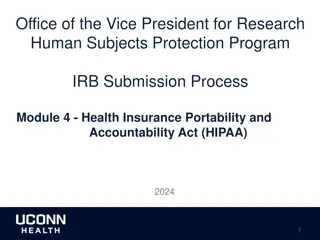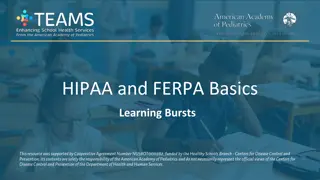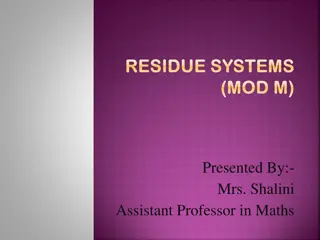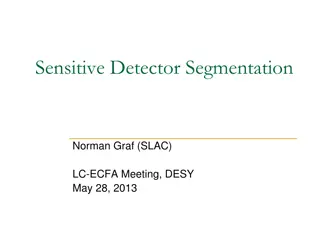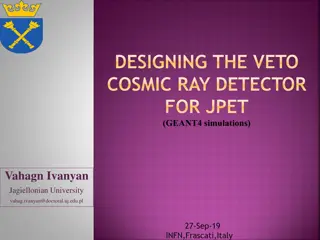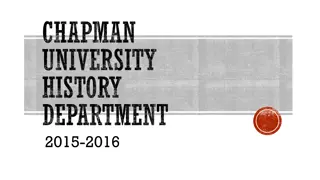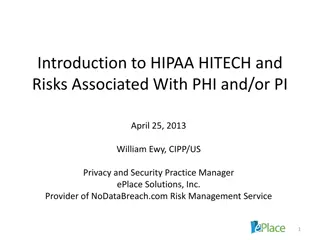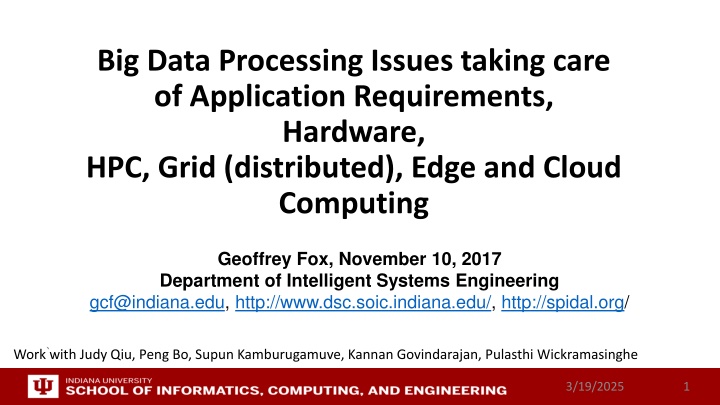
Big Data Processing Systems and Requirements Explained
Explore the intricacies of big data processing systems and application requirements in this insightful article by Geoffrey Fox. Delve into hardware, HPC, grid computing, edge and cloud computing, and more to understand the complex landscape of data processing technologies.
Uploaded on | 1 Views
Download Presentation

Please find below an Image/Link to download the presentation.
The content on the website is provided AS IS for your information and personal use only. It may not be sold, licensed, or shared on other websites without obtaining consent from the author. If you encounter any issues during the download, it is possible that the publisher has removed the file from their server.
You are allowed to download the files provided on this website for personal or commercial use, subject to the condition that they are used lawfully. All files are the property of their respective owners.
The content on the website is provided AS IS for your information and personal use only. It may not be sold, licensed, or shared on other websites without obtaining consent from the author.
E N D
Presentation Transcript
Big Data Processing Issues taking care of Application Requirements, Hardware, HPC, Grid (distributed), Edge and Cloud Computing Geoffrey Fox, November 10, 2017 Department of Intelligent Systems Engineering gcf@indiana.edu, http://www.dsc.soic.indiana.edu/, http://spidal.org/ ` Work with Judy Qiu, Peng Bo, Supun Kamburugamuve, Kannan Govindarajan, Pulasthi Wickramasinghe 3/19/2025 1
Big Data Processing Systems Application Requirements: The structure of application clearly impacts needed hardware and software Pleasingly parallel Workflow Global Machine Learning Data model: SQL, NoSQL; File Systems, Object store; Lustre, HDFS Distributed data from distributed sensors and instruments (Internet of Things) requires Edge computing model Device Fog Cloud model and streaming data software and algorithms Hardware: node (accelerators such as GPU or KNL for deep learning) and multi- node architecture configured as HPC Cloud; Disks speed and location This implies software requirements Analytics Data management Streaming or Repository access or both 3/19/2025 2
Motivating Remarks Use of public clouds increasing rapidly Clouds becoming diverse with subsystems containing GPU s, FPGA s, high performance networks, storage, memory Rich software stacks: HPC (High Performance Computing) for Parallel Computing less used than Apache for Big Data Software Stack ABDS including some edge computing (streaming data) Messaging is used pervasively for parallel and distributed computing with Service-oriented Systems, Internet of Things and Edge Computing growing in importance using messages differently from each other and parallel computing. Serverless (server hidden) computing attractive to user: No server is easier to manage than no server A lot of confusion coming from different communities (database, distributed, parallel computing, machine learning, computational/data science) investigating similar ideas with little knowledge exchange and mixed up (unclear) requirements 3/19/2025 3
Requirements On general principles parallel and distributed computing have different requirements even if sometimes similar functionalities Apache stack ABDS typically uses distributed computing concepts For example, Reduce operation is different in MPI (Harp) and Spark Large scale simulation requirements are well understood Big Data requirements are not clear but there are a few key use types 1) Pleasingly parallel processing (including local machine learning LML) as of different tweets from different users with perhaps MapReduce style of statistics and visualizations; possibly Streaming 2) Database model with queries again supported by MapReduce for horizontal scaling 3) Global Machine Learning GML with single job using multiple nodes as classic parallel computing 4) Deep Learning certainly needs HPC possibly only multiple small systems Current workloads stress 1) and 2) and are suited to current clouds and to ABDS (with no HPC) This explains why Spark with poor GML performance is so successful and why it can ignore MPI even though MPI best technology for parallel computing 3/19/2025 4
Predictions/Assumptions Supercomputers will be essential for large simulations and will run other applications HPC Clouds or Next-Generation Commodity Systems will be a dominant force Merge Cloud HPC and (support of) Edge computing Federated Clouds running in multiple giant datacenters offering all types of computing Distributed data sources associated with device and Fog processing resources Server-hidden computing and Function as a Service FaaS for user pleasure Support a distributed event-driven serverless dataflow computing model covering batch and streaming data as HPC-FaaS Needing parallel and distributed (Grid) computing ideas Span Pleasingly Parallel to Data management to Global Machine Learning 3/19/2025 5
Convergence Points for HPC-Cloud-Edge- Big Data-Simulation Applications Divide use cases into Data and Model and compare characteristics separately in these two components with 64 Convergence Diamonds (features). Identify importance of streaming data, pleasingly parallel, global/local machine-learning Software Single model of High Performance Computing (HPC) Enhanced Big Data Stack HPC-ABDS. 21 Layers adding high performance runtime to Apache systems HPC-FaaS Programming Model Serverless Infrastructure as a Service IaaS Hardware system designed for functionality and performance of application type e.g. disks, interconnect, memory, CPU acceleration different for machine learning, pleasingly parallel, data management, streaming, simulations Use DevOps to automate deployment of event-driven software defined systems on hardware: HPCCloud 2.0 Total System Solutions (wisdom) as a Service: HPCCloud 3.0 3/19/2025 6
https://bigdatawg.nist.gov/V2_output_docs.php NIST Big Data Public Working Group Standards Best Practice Indiana Indiana 3/19/2025 7
Both Geospatial Information System HPC Simulations 10D 9 8D Data Source and Style View (Nearly all Data) Global (Analytics/Informatics/Simulations) Local (Analytics/Informatics/Simulations) Linear Algebra Kernels/Many subclasses Internet of Things Simulations Analytics (Model for Big Data) Metadata/Provenance Shared / Dedicated / Transient / Permanent 7D 64 Features in 4 views for Unified Classification ofBig Data and Simulation Applications 6D Evolution of Discrete Systems Archived/Batched/Streaming S1, S2, S3, S4, S5 5D Streaming Data Algorithms Optimization Methodology Data Search/Query/Index HDFS/Lustre/GPFS 4D Nature of mesh if used Recommender Engine Iterative PDE Solvers Base Data Statistics Particles and Fields Files/Objects Enterprise Data Model SQL/NoSQL/NewSQL Multiscale Method Data Classification Micro-benchmarks 3D 2D 1D Graph Algorithms Spectral Methods N-body Methods Data Alignment Core Libraries Visualization Learning Convergence Diamonds Views and Facets D 4 M 4 D 5 D 6 M 6 M 8 D 9 M 9 D 10 M 10 M 11 D 12 M 12 D 13 M 13 M 14 1 2 3 7 22 M 21 M 20 M 19 M 18 M 17 M 16 M 11 M 10 M 9 M 8 M 7 M 6 M 5 M 4 M 15 M 14 M 13 M 12 M 3 M 2 M 1 M Data Metric = M / Non-Metric =N Data Metric = M / Non-Metric =N =NN /= N Execution Environment; Core libraries Dynamic = D/ Static = S Dynamic = D/ Static = S Model Abstraction Performance Metrics Flops per Byte/Memory IO/Flops per watt Data Volume Model Size Data Velocity Data Variety Model Variety Veracity Communication Structure Regular=R / Irregular =I Data Regular=R / Irregular =I Model Data Abstraction Iterative /Simple Simulation (Exascale) Processing Diamonds Big Data Processing Diamonds 1 2 Pleasingly Parallel Classic MapReduce Map-Collective Map Point-to-Point Processing View (All Model) 3 4 5 Map Streaming Shared Memory 6 41/51 Streaming 26/51 Pleasingly Parallel 25/51 Mapreduce Single Program Multiple Data Bulk Synchronous Parallel 7 8 Execution View (Mix of Data and Model) Fusion Dataflow 9 10 Agents 11M Problem Architecture View (Nearly all Data+Model) Workflow 3/19/2025 8 12
Parallel Computing: Big Data and Simulations All the different programming models (Spark, Flink, Storm, Naiad, MPI/OpenMP) have the same high level approach but application requirements and system architecture can give different appearance First: Break Problem Data and/or Model-parameters into parts assigned to separate nodes, processes, threads Then: In parallel, do computations typically leaving data untouched but changing model-parameters. Called Maps in MapReduce parlance If Pleasingly parallel, that s all it is except for management If Globally parallel, need to communicate results of computations between nodes during job Communication mechanism (TCP, RDMA, Native Infiniband) can vary Communication Style (Point to Point, Collective, Pub-Sub) can vary Possible need for sophisticated dynamic changes in partioning (load balancing) Computation either on fixed tasks or flow between tasks Choices: Automatic Parallelism or Not Choices: Complicated Parallel Algorithm or Not Fault-Tolerance model can vary Output model can vary: RDD or Files or Pipes 3/19/2025 9
Software HPC-ABDS HPC-FaaS 3/19/2025 10
Kaleidoscope of (Apache) Big Data Stack (ABDS) and HPC Technologies 17) Workflow-Orchestration: ODE, ActiveBPEL, Airavata, Pegasus, Kepler, Swift, Taverna, Triana, Trident, BioKepler, Galaxy, IPython, Dryad, Naiad, Oozie, Tez, Google FlumeJava, Crunch, Cascading, Scalding, e-Science Central, Azure Data Factory, Google Cloud Dataflow, NiFi (NSA), Jitterbit, Talend, Pentaho, Apatar, Docker Compose, KeystoneML 16) Application and Analytics: Mahout , MLlib , MLbase, DataFu, R, pbdR, Bioconductor, ImageJ, OpenCV, Scalapack, PetSc, PLASMA MAGMA, Azure Machine Learning, Google Prediction API & Translation API, mlpy, scikit-learn, PyBrain, CompLearn, DAAL(Intel), Caffe, Torch, Theano, DL4j, H2O, IBM Watson, Oracle PGX, GraphLab, GraphX, IBM System G, GraphBuilder(Intel), TinkerPop, Parasol, Dream:Lab, Google Fusion Tables, CINET, NWB, Elasticsearch, Kibana, Logstash, Graylog, Splunk, Tableau, D3.js, three.js, Potree, DC.js, TensorFlow, CNTK 15B) Application Hosting Frameworks: Google App Engine, AppScale, Red Hat OpenShift, Heroku, Aerobatic, AWS Elastic Beanstalk, Azure, Cloud Foundry, Pivotal, IBM BlueMix, Ninefold, Jelastic, Stackato, appfog, CloudBees, Engine Yard, CloudControl, dotCloud, Dokku, OSGi, HUBzero, OODT, Agave, Atmosphere 15A) High level Programming: Kite, Hive, HCatalog, Tajo, Shark, Phoenix, Impala, MRQL, SAP HANA, HadoopDB, PolyBase, Pivotal HD/Hawq, Presto, Google Dremel, Google BigQuery, Amazon Redshift, Drill, Kyoto Cabinet, Pig, Sawzall, Google Cloud DataFlow, Summingbird 14B) Streams: Storm, S4, Samza, Granules, Neptune, Google MillWheel, Amazon Kinesis, LinkedIn, Twitter Heron, Databus, Facebook Puma/Ptail/Scribe/ODS, AzureStream Analytics, Floe, Spark Streaming, Flink Streaming, DataTurbine 14A) Basic Programming model and runtime, SPMD, MapReduce: Hadoop, Spark, Twister, MR-MPI, Stratosphere (Apache Flink), Reef, Disco, Hama, Giraph, Pregel, Pegasus, Ligra, GraphChi, Galois, Medusa-GPU, MapGraph, Totem 13) Inter process communication Collectives, point-to-point, publish-subscribe: MPI, HPX-5, Argo BEAST HPX-5 BEAST PULSAR, Harp, Netty, ZeroMQ, ActiveMQ, RabbitMQ, NaradaBrokering, QPid, Kafka, Kestrel, JMS, AMQP, Stomp, MQTT, Marionette Collective, Public Cloud: Amazon SNS, Lambda, Google Pub Sub, Azure Queues, Event Hubs 12) In-memory databases/caches: Gora (general object from NoSQL), Memcached, Redis, LMDB (key value), Hazelcast, Ehcache, Infinispan, VoltDB, H-Store 12) Object-relational mapping: Hibernate, OpenJPA, EclipseLink, DataNucleus, ODBC/JDBC 12) Extraction Tools: UIMA, Tika 11C) SQL(NewSQL): Oracle, DB2, SQL Server, SQLite, MySQL, PostgreSQL, CUBRID, Galera Cluster, SciDB, Rasdaman, Apache Derby, Pivotal Greenplum, Google Cloud SQL, Azure SQL, Amazon RDS, Google F1, IBM dashDB, N1QL, BlinkDB, Spark SQL 11B) NoSQL: Lucene, Solr, Solandra, Voldemort, Riak, ZHT, Berkeley DB, Kyoto/Tokyo Cabinet, Tycoon, Tyrant, MongoDB, Espresso, CouchDB, Couchbase, IBM Cloudant, Pivotal Gemfire, HBase, Google Bigtable, LevelDB, Megastore and Spanner, Accumulo, Cassandra, RYA, Sqrrl, Neo4J, graphdb, Yarcdata, AllegroGraph, Blazegraph, Facebook Tao, Titan:db, Jena, Sesame Public Cloud: Azure Table, Amazon Dynamo, Google DataStore 11A) File management: iRODS, NetCDF, CDF, HDF, OPeNDAP, FITS, RCFile, ORC, Parquet 10) Data Transport: BitTorrent, HTTP, FTP, SSH, Globus Online (GridFTP), Flume, Sqoop, Pivotal GPLOAD/GPFDIST 9) Cluster Resource Management: Mesos, Yarn, Helix, Llama, Google Omega, Facebook Corona, Celery, HTCondor, SGE, OpenPBS, Moab, Slurm, Torque, Globus Tools, Pilot Jobs 8) File systems: HDFS, Swift, Haystack, f4, Cinder, Ceph, FUSE, Gluster, Lustre, GPFS, GFFS Public Cloud: Amazon S3, Azure Blob, Google Cloud Storage 7) Interoperability: Libvirt, Libcloud, JClouds, TOSCA, OCCI, CDMI, Whirr, Saga, Genesis 6) DevOps: Docker (Machine, Swarm), Puppet, Chef, Ansible, SaltStack, Boto, Cobbler, Xcat, Razor, CloudMesh, Juju, Foreman, OpenStack Heat, Sahara, Rocks, Cisco Intelligent Automation for Cloud, Ubuntu MaaS, Facebook Tupperware, AWS OpsWorks, OpenStack Ironic, Google Kubernetes, Buildstep, Gitreceive, OpenTOSCA, Winery, CloudML, Blueprints, Terraform, DevOpSlang, Any2Api 5) IaaS Management from HPC to hypervisors: Xen, KVM, QEMU, Hyper-V, VirtualBox, OpenVZ, LXC, Linux-Vserver, OpenStack, OpenNebula, Eucalyptus, Nimbus, CloudStack, CoreOS, rkt, VMware ESXi, vSphere and vCloud, Amazon, Azure, Google and other public Clouds Networking: Google Cloud DNS, Amazon Route 53 HPC-ABDS Cross- Cutting Functions 1) Message and Data Protocols: Avro, Thrift, Protobuf 2) Distributed Coordination : Google Chubby, Zookeeper, Giraffe, JGroups 3) Security & Privacy: InCommon, Eduroam OpenStack Keystone, LDAP, Sentry, Sqrrl, OpenID, SAML OAuth 4) Monitoring: Ambari, Ganglia, Nagios, Inca Integrated wide range of HPC and Big Data technologies. I gave up updating list in January 2016! 21 layers Over 350 Software Packages January 29 2016 3/19/2025 11
Components of Big Data Stack Google likes to show a timeline; we can build on (Apache version of) this 2002 Google File System GFS ~HDFS (Level 8) 2004 MapReduce Apache Hadoop (Level 14A) 2006 Big Table Apache Hbase (Level 11B) 2008 Dremel Apache Drill (Level 15A) 2009 Pregel Apache Giraph (Level 14A) 2010 FlumeJava Apache Crunch (Level 17) 2010 Colossus better GFS (Level 18) 2012 Spanner horizontally scalable NewSQL database ~CockroachDB (Level 11C) 2013 F1 horizontally scalable SQL database (Level 11C) 2013 MillWheel ~Apache Storm, Twitter Heron (Google not first!) (Level 14B) 2015 Cloud Dataflow Apache Beam with Spark or Flink (dataflow) engine (Level 17) Functionalities not identified: Security(3), Data Transfer(10), Scheduling(9), DevOps(6), serverless computing (where Apache has OpenWhisk) (5) HPC-ABDS Levels in () 3/19/2025 12
Different choices in software systems in Clouds and HPC. HPC-ABDS takes cloud software augmented by HPC when needed to improve performance 16 of 21 layers plus languages 3/19/2025 13
Machine Learning Library 3/19/2025 14
Mahout and SPIDAL Mahout was Hadoop machine learning library but largely abandoned as Spark outperformed Hadoop SPIDAL outperforms Spark Mllib and Flink due to better communication and in-place dataflow. SPIDAL also has community algorithms Biomolecular Simulation Graphs for Network Science Image processing for pathology and polar science 3/19/2025 15
Core SPIDAL Parallel HPC Library with Collective Used DA-MDS Rotate, AllReduce, Broadcast Directed Force Dimension Reduction AllGather, Allreduce Irregular DAVS Clustering Partial Rotate, AllReduce, Broadcast DA Semimetric Clustering Rotate, AllReduce, Broadcast K-means AllReduce, Broadcast, AllGather DAAL SVM AllReduce, AllGather SubGraph Mining AllGather, AllReduce Latent Dirichlet Allocation Rotate, AllReduce Matrix Factorization (SGD) Rotate DAAL Recommender System (ALS) Rotate DAAL Singular Value Decomposition (SVD) AllGather DAAL QR Decomposition (QR) Reduce, Broadcast DAAL Neural Network AllReduce DAAL Covariance AllReduce DAAL Low Order Moments Reduce DAAL Naive Bayes Reduce DAAL Linear Regression Reduce DAAL Ridge Regression Reduce DAAL Multi-class Logistic Regression Regroup, Rotate, AllGather Random Forest AllReduce Principal Component Analysis (PCA) AllReduce DAAL DAAL implies integrated with Intel DAAL Optimized Data Analytics Library (Runs on KNL!) 3/19/2025 16
Bringing it together Twister2 3/19/2025 17
Fog Cloud HPC HPC Cloud HPC Cloud HPC Cloud can be federated Centralized HPC Cloud + IoT Devices Centralized HPC Cloud + Edge = Fog + IoT Devices Implementing Twister2 to support a Grid linked to an HPC Cloud 3/19/2025 18
Twister2: Next Generation Grid - Edge HPC Cloud Our original 2010 Twister paper has 907 citations; it was a particular approach to MapCollective iterative processing for machine learning improving Hadoop Re-engineer current Apache Big Data and HPC software systems as a toolkit Support a serverless (cloud-native) dataflow event-driven HPC-FaaS (microservice) framework running across application and geographic domains. Support all types of Data analysis from GML to Edge computing Build on Cloud best practice but use HPC wherever possible to get high performance Smoothly support current paradigms Hadoop, Spark, Flink, Heron, MPI, DARMA Use interoperable common abstractions but multiple polymorphic implementations. i.e. do not require a single runtime Focus on Runtime but this implies HPC-FaaS programming and execution model This defines a next generation Grid based on data and edge devices not computing as in old Grid See paper http://dsc.soic.indiana.edu/publications/twister2_design_big_data_toolkit.pdf 3/19/2025 19
Proposed Twister2 Approach Unit of Processing is an Event driven Function (a microservice) replaces libraries Can have state that may need to be preserved in place (Iterative MapReduce) Functions can be single or 1 of 100,000 maps in large parallel code Processing units run in HPC clouds, fogs or devices but these all have similar software architecture (see AWS Greengrass and Lambda) Universal Programming model so Fog (e.g. car) looks like a cloud to a device (radar sensor) while public cloud looks like a cloud to the fog (car) Build on the runtime of existing systems Hadoop, Spark, Flink, Naiad Big Data Processing Storm, Heron Streaming Dataflow Kepler, Pegasus, NiFi workflow systems Harp Map-Collective, MPI and HPC AMT runtime like DARMA And approaches such as GridFTP and CORBA/HLA for wide area data links 3/19/2025 20
Twister2 Components I Component Implementation State and Configuration Management; Program, Data and Message Level Area Comments: User API Change execution mode; save and reset state Different systems make different choices - why? Owner Computes Rule Client API (e.g. Python) for Job Management Coordination Points Architecture Specification Mapping of Resources to Bolts/Maps in Containers, Processes, Threads Spark Flink Hadoop Pregel MPI modes Plugins for Slurm, Yarn, Mesos, Marathon, Aurora Monitoring of tasks and migrating tasks for better resource utilization OpenWhisk Execution Semantics Parallel Computing (Dynamic/Static) Resource Allocation Job Submission Task migration Elasticity Streaming and FaaS Events Task Execution Task-based programming with Dynamic or Static Graph API; Heron, OpenWhisk, Kafka/RabbitMQ Task System FaaS API; Process, Threads, Queues Dynamic Scheduling, Static Scheduling, Pluggable Scheduling Algorithms Static Graph, Dynamic Graph Generation Task Scheduling Support accelerators (CUDA,KNL) Task Graph 9/25/2017 21
Twister2 Components II Component Implementation Heron Area Comments This is user level and could map to multiple communication systems Streaming, ETL data pipelines; Messages Fine-Grain Twister2 Dataflow communications: MPI,TCP and RMA Dataflow Communication Communication API Define new Dataflow communication API and library MPI Point to Point and Collective API Coarse grain Dataflow from NiFi, Kepler? Conventional MPI, Harp BSP Communication Map-Collective Static (Batch) Data Streaming Data File Systems, NoSQL, SQL Message Brokers, Spouts Relaxed Distributed Shared Memory(immutable data), Mutable Distributed Data Upstream (streaming) backup; Lightweight; Coordination Points; Spark/Flink, MPI and Heron models Research needed Data API Data Access Data Transformation API; Data Management Distributed Data Set Spark RDD, Heron Streamlet Streaming and batch cases distinct; Crosses all components Fault Tolerance Check Pointing Storage, Messaging, execution Crosses all Components Security 9/25/2017 22
Summary of Big Data HPC Convergence I Applications, Benchmarks and Libraries 51 NIST Big Data Use Cases, 7 Computational Giants of the NRC report, 13 Berkeley dwarfs, 7 NAS parallel benchmarks Unified discussion by separately discussing data & model for each application; 64 facets Convergence Diamonds -- characterize applications Characterization identifies hardware and software features for each application across big data, simulation; complete set of benchmarks (NIST) Exemplar Ogre and Convergence Diamond Features Overall application structure e.g. pleasingly parallel Data Features e.g. from IoT, stored in HDFS . Processing Features e.g. uses neural nets or conjugate gradient Execution Structure e.g. data or model volume Need to distinguish data management from data analytics Management and Search I/O intensive and suitable for classic clouds Science data has fewer users than commercial but requirements poorly understood Analytics has many features in common with large scale simulations Data analytics often SPMD, BSP and benefits from high performance networking and communication libraries. Decompose Model (as in simulation) and Data (bit different and confusing) across nodes of cluster 3/19/2025 23
Summary of Big Data HPC Convergence II Software Architecture and its implementation HPC-ABDS: Cloud-HPC interoperable software: performance of HPC (High Performance Computing) and the rich functionality of the Apache Big Data Stack. Added HPC to Hadoop, Storm, Heron, Spark; Twister2 will add to Beam and Flink as a HPC-FaaS programming model Could work in Apache model contributing code in different ways One approach is an HPC project in Apache Foundation HPCCloud runs same HPC-ABDS software across all platforms but data management nodes have different balance in I/O, Network and Compute from model nodes Optimize to data and model functions as specified by convergence diamonds rather than optimizing for simulation and big data Convergence Language: Make C++, Java, Scala, Python (R) perform well Training: Students prefer to learn machine learning and clouds and need to be taught importance of HPC to Big Data Sustainability: research/HPC communities cannot afford to develop everything (hardware and software) from scratch HPCCloud 2.0 uses DevOps to deploy HPC-ABDS on clouds or HPC HPCCloud 3.0 delivers Solutions as a Service with an HPC-FaaS programming model 3/19/2025 24
Summary of Twister2: Next Generation HPC Cloud + Edge + Grid We have built a high performance data analysis library SPIDAL supporting Global and Local Machine Learning We have integrated HPC into many Apache systems with HPC-ABDS SPIDAL ML library currently implemented as Harp on Hadoop but PHI needs richer Spark (and Heron for Streaming?) Twister2 will offer Hadoop, Spark (batch big data), Heron (Streaming) and MPI(parallel computing) Event driven computing model built around Cloud and HPC and spanning batch, streaming, and edge applications Highly parallel on cloud; possibly sequential at the edge Integrate current technology of FaaS (Function as a Service) and server-hidden (serverless) computing (OpenWhisk) with HPC and Apache batch/streaming systems Apache systems use dataflow communication which is natural for distributed systems but inevitably slow for classic parallel computing Twister2 has dataflow and parallel communication models 3/19/2025 25




